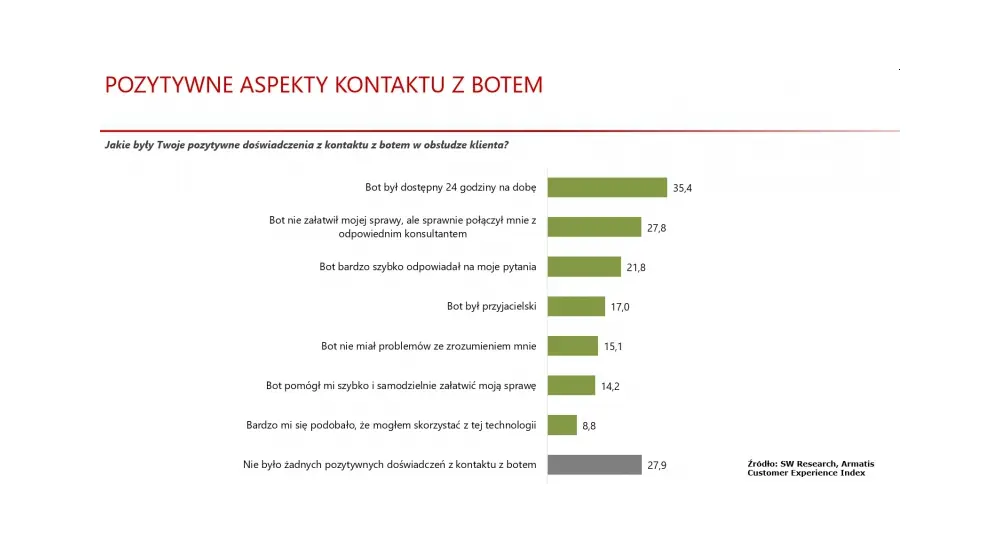
After interacting with a bot, Poles most frequently (31%) feel frustration, with 11.2% experiencing it to the extent that they shared their negative experience with someone. In contrast, 15% of respondents expressed satisfaction with bot service, with an additional 2% sharing their positive experience with friends. 40.3% of Poles served by bots hold a neutral opinion on them.
Positive and Negative Aspects of Bot Interaction
- The percentage of Poles feeling frustrated after interacting with a bot is nearly half that of the global rate, where according to a recent UJET study, as many as 80% of consumers experience discomfort after encountering a bot in customer service - says Krzysztof Lewiński, country director at Armatis Polska, a customer service and sales outsourcing provider.
The most frequently cited positive aspects of bot service among Poles include:
- 24/7 availability (35%),
- efficient connection to a consultant when the bot cannot resolve the issue (28%),
- quick answers to questions (22%).
On the other hand, negative feelings among those served by bots were mainly due to:
- the inability to directly contact a human without going through the bot (39%),
- the bot’s inability to help the customer (38%),
- the bot not understanding or responding appropriately (37%).
A total of 15% of respondents report no negative experiences. However, the majority (71%) prefer human service, even if it means waiting in line. Almost one in five people (18%) would choose immediate service by a chatbot, and one in ten would choose immediate voice bot assistance.
The Growth of AI-Supported Customer Service
As many as 35% of respondents believe that companies should implement bots in their service channels, but with the option to easily switch to a human. A slightly smaller portion (32%) thinks bot service should be one of the options, not a mandatory start. One in four believes bots should identify the issue and then connect to a human. Twenty-two percent of respondents view the implementation of bots in customer service negatively.
- Responses to this last question clearly show Poles` openness to bots in customer service centers if certain conditions are met, such as the option to switch to a human at any time or the non-compulsory nature of bot service - comments Krzysztof Lewiński. - It is worth adhering to this, given the generally negative sentiment among Poles toward bots in customer service. However, I am convinced this will change due to the increasing quality of chatbots and voice bots, with the advent of a new generation of AI-based solutions.
The Armatis Customer Experience Index study was conducted by SW Research on behalf of Armatis in April 2023. The main goal of the study was to examine the experiences and opinions of Poles regarding AI-based bot customer service.
COMMERCIAL BREAK
New articles in section Marketing and PR
Brand visibility in the age of algorithms
Aleksander Pawzun
A few years ago, everything was simpler. It was enough to have a good website, do SEO, run a blog, and publish on social media. Whoever was systematic was visible. Whoever invested in content and positioning gained customers. That world no longer exists.
Queue psychology. Scientists' discovery used in Call Centers
Andrzej Sowula
The discovery first described by psychologists in the second half of 2024 concerns the so-called "relative progress effect". When customers observe fast service at the beginning of their wait, they tolerate slower service much better later in the waiting period.
#POMAGAM2026 Can a New Year's resolution go viral?
wspieramy
Is a million good deeds a lot? Ten-year-old Emilka wants to find out. She just announced the I Resolve to Help campaign on the internet and urges everyone to make a unique New Year's resolution. That we help each other more often in 2026.
See articles on a similar topic:
Artificial Intelligence in B2B Sales. Forrester's Predictions for 2025
BARD
B2B boldly experimented with generative artificial intelligence in 2024, but next year, industry leaders plan to focus on sustainable solutions that increase revenue.
The future of search is now. How AI is reshaping brand visibility
KFi
AI Search and Share of Voice are no longer optional marketing metrics. They’re essential. Yet only 7% of Polish companies use AI. In the new search landscape, that’s nowhere near enough. Fall behind now, and your brand could simply... vanish from the internet.
Short Social Video. IAB Poland Report on Short Videos in Social Media
Krzysztof Fiedorek
According to the IAB Poland report from May 2024, short video clips are becoming increasingly popular in Poland. In 2023, 61% of internet users in Poland watched the format known as short social video, and 23% of them created such videos themselves. Polish internet users spend an average of 43 minutes a day watching them.
How to find topics for communication
Aleksander Pawzun
"We have nothing to say" is a phrase heard all too often. Yet practice shows that every business has the potential to tell stories. You just need to learn how to spot them and turn them into content that appeals to your audience.





























